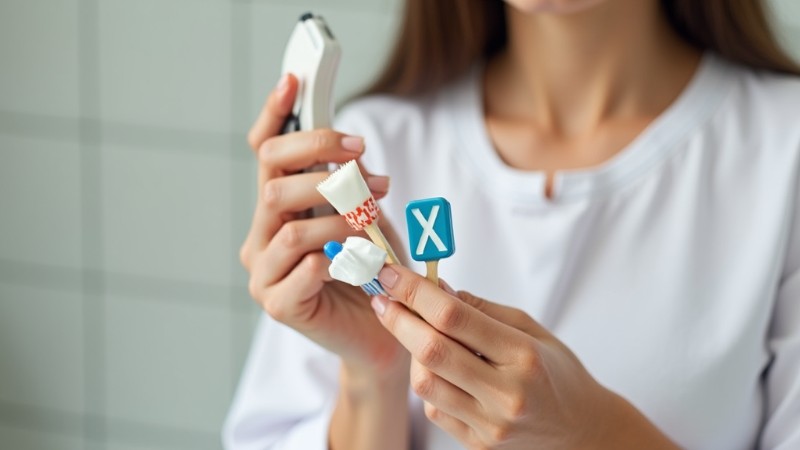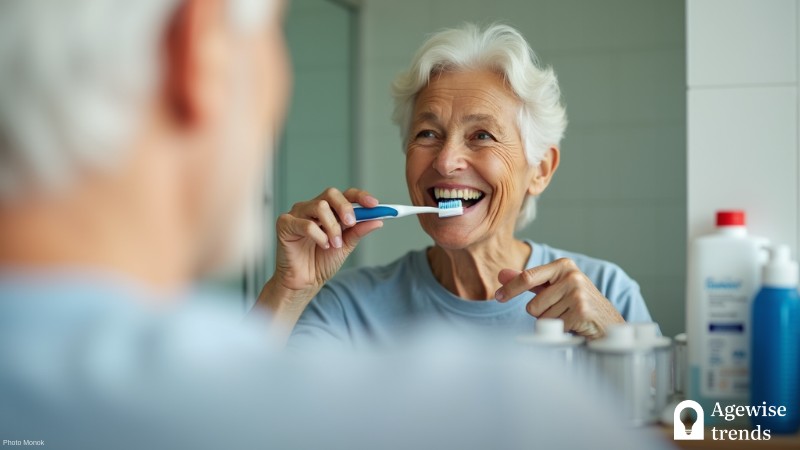A recent discussion on Reddit’s Ask a Dentist thread highlighted common misconceptions about dental hygiene that could be harmful. To maintain healthy teeth and gums, it’s crucial to distinguish fact from fiction.
Relying on trustworthy sources of information is essential when it comes to making informed decisions about oral health, as this helps individuals steer clear of misleading claims and myths that could potentially lead to a range of problems, including tooth decay, sensitivity, and other oral health issues.
Key Takeaways
Distinguishing fact from fiction is crucial in maintaining healthy teeth and gums, as relying on trustworthy sources of information helps steer clear of misleading claims and myths that could lead to a range of problems.
- Charcoal toothpaste can damage enamel and increase the risk of cavities and sensitivity due to its abrasive nature.
- Prioritizing natural ingredients over fluoride in toothpaste may not provide the same level of protection against tooth decay as fluoride-containing toothpastes.
- Brushing teeth too hard can wear away at the protective layer of enamel, making teeth more susceptible to sensitivity, discoloration, and decay.
Misleading claims and myths
The world of oral health, like many other areas of health and wellness, is constantly evolving. Unfortunately, this evolution often leads to the emergence of new trends and fads that can be misleading and even harmful. Here are some of the misconceptions:
Charcoal toothpaste as teeth whitening
Dentists cautioned against using charcoal toothpaste for whitening, as it can damage enamel and increase the risk of cavities and sensitivity. Expensive, trendy toothpastes often contain misleading labeling and may not be as effective as claimed.
Charcoal is highly abrasive, meaning it can scrape away at the tooth’s protective enamel layer. This can lead to sensitivity, tooth discoloration, and an increased risk of cavities. Over time, excessive abrasion can cause the gums to recede, exposing the tooth roots and making them more susceptible to decay and infection.
Also charcoal does not penetrate the enamel to provide lasting whitening. Some charcoal toothpastes may contain impurities that can actually stain teeth. As charcoal can damage the enamel of the teeth it can be more susceptible to bacterial attack, which can lead to cavities. Many charcoal toothpastes do not contain fluoride, a crucial mineral for preventing cavities and strengthening tooth enamel.
Charcoal can also irritate the gums, leading to inflammation and an increased risk of gum disease. Instead of using toothpaste with charcoal, consult with a dentist for safe and effective professional teeth whitening procedures.
Maintain regular brushing, flossing, and dental check-ups to keep your teeth healthy and white. It’s important to prioritize the long-term health of your teeth and gums. While charcoal toothpaste may seem like a quick fix for whitening, the potential risks far outweigh the benefits.
Prioritizing natural ingredients over fluoride
Fluoride in toothpaste is essential for enamel remineralization and antimicrobial activity. When teeth are exposed to acids from food and bacteria, tiny cracks can develop in the enamel. Fluoride helps to repair these microcracks, making teeth more resistant to decay.
Fluoride has antibacterial properties that can help to reduce the number of harmful bacteria in the mouth. This is particularly important because bacteria produce acids that can lead to tooth decay.
By reducing the bacterial population, fluoride can help to prevent cavities from forming. Many “herbal” or “natural” toothpastes may not contain fluoride. While these products may claim to be healthier, they may not provide the same level of protection against tooth decay as fluoride-containing toothpastes.
It’s essential to carefully read the ingredients label of any toothpaste you consider using. Look for “sodium fluoride” or “fluoride” listed among the ingredients.
The benefits of Xylitol
Xylitol is a sugar alcohol that has gained popularity as a natural sweetener in many products, including sugar-free gum. It offers several significant benefits for oral health. It has a unique ability to trap bacteria in the mouth. When bacteria consume xylitol, they are unable to metabolize it properly, leading to their death.
By reducing the bacterial population, xylitol can help to prevent plaque formation, a major factor in tooth decay and gum disease. Xylitol can help to neutralize acids produced by bacteria, which can contribute to tooth erosion and decay.
Chewing xylitol-containing gum can stimulate the production of saliva, which helps to wash away food particles and bacteria, reducing the risk of decay. Some studies also suggest that xylitol may help to promote the uptake of calcium and phosphate from saliva, which can aid in the remineralization of tooth enamel.
But remember that while Xylitol is generally safe for humans in moderate amounts, it is highly toxic to dogs and cats. Even small amounts can cause liver failure in these animals. It’s crucial to keep xylitol products out of reach of pets.
Brushing teeth hard
While it might seem intuitive that brushing harder would remove more plaque and debris, this is a common misconception. Brushing too vigorously can have detrimental effects on your teeth and gums.
The enamel, the hard outer layer of your teeth, is relatively soft. Brushing too hard can wear away at this protective layer, making your teeth more susceptible to sensitivity, discoloration, and decay.
Also, aggressive brushing can cause your gums to recede, exposing the sensitive root surfaces of your teeth. This can lead to increased sensitivity, gum disease, and even tooth loss. Brushing too hard can create tiny tears in your gums, which can make them more susceptible to infection.
Instead of relying on brute force, focus on using the correct brushing technique. Use a toothbrush with soft bristles. Hard bristles can be too abrasive and damage your teeth and gums. Brush your teeth in small, circular motions, covering all surfaces of each tooth.
Brush your teeth for at least two minutes, twice a day. Don’t forget to floss daily to remove plaque and debris from between your teeth. By adopting a gentle brushing technique and maintaining good oral hygiene habits, you can effectively clean your teeth without harming them.
The struggle of dental hygiene for kids
A dentist shared personal experiences of the challenges in getting toddlers to brush their teeth, sometimes requiring parents to hold them down. Establishing good dental hygiene habits from an early age is crucial for long-term oral health.
The responsibility of teaching children good dental hygiene habits falls squarely on the shoulders of parents, who must take a proactive and committed approach to guiding their kids towards developing healthy oral care practices.
By creating a predictable schedule and incorporating engaging activities into toothbrushing routines, parents can transform this essential task into an enjoyable and rewarding experience for their children.
Despite the challenges that often arise when trying to instill good oral care practices in young children, parents must make a concerted effort to establish these habits from an early age.
The role of social media
Social media platforms offer a wealth of information on oral health, serving as a valuable resource for individuals seeking to stay informed about the most recent findings and expert recommendations in the field of dental care.
However, it’s essential to be cautious of misinformation and overly promotional content that may not be backed by scientific evidence when using social media as a resource for learning about oral health.
Staying informed
To stay on top of the latest research and recommendations, follow trusted dental professionals and organizations on social media. Engage with their content and participate in online discussions to learn more about good oral health practices. By separating fact from fiction and staying informed, individuals can make informed decisions about their dental care and maintain healthy teeth and gums for years to come.
Individuals can avoid falling prey to misinformation and myths that may have serious consequences for their teeth and gums, ultimately leading to a range of potential dental and oral problems issues.
When choosing toothpaste or gum, individuals should prioritize products that have been thoroughly vetted through scientific research and have received endorsements from trusted professional bodies.
By being aware of the need to scrutinize information carefully and consider multiple perspectives before making a decision, individuals can make informed choices about their dental hygiene and take proactive steps towards maintaining good oral health.















